Where do Scottish Tory MPs stand on Johnson's future?
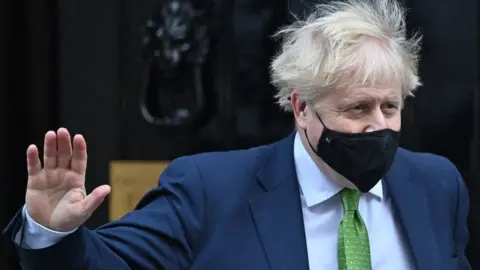 Getty Images
Getty ImagesThe publication of Sue Gray's investigation into parties and other get-togethers in and around Downing Street is a moment of decision for Conservative MPs.
That includes the clutch of Scottish Tories at Westminster who have yet to declare whether they continue to back Boris Johnson or the campaign to sack him.
The Scottish six includes two MPs who have already made up their minds and taken completely opposing positions on the future of their UK party leader and prime minister.
As a member of the cabinet, Alister Jack is obliged to be supportive. He has offered Boris Johnson 100% backing and is expected to remain loyal pending the results of the police investigation.
Mr Jack, the MP for Dumfries and Galloway, has said he tried to persuade the Scottish party leader, Douglas Ross, not to reach a judgement before the Gray report but in that he was unsuccessful.
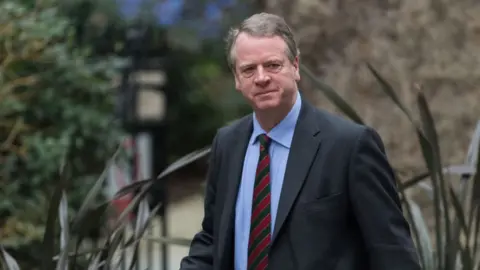 Getty Images
Getty ImagesA fortnight ago, on 12 January, Mr Ross said Boris Johnson's position had become "untenable". He was publicly backed by the bulk of the Conservative group at Holyrood and dismissed as a "lightweight" by cabinet minister Jacob Rees-Mogg.
Mr Ross has subsequently said that he has sent a letter to the chairman of the backbench committee of Tory MPs, Sir Graham Brady, calling for a vote of no confidence in Boris Johnson.
If the number of Conservative MPs sending letters of that sort reaches 54 then Mr Johnson will face a confidence vote which could trigger a leadership election if he does not have the support of more than half his MPs.
If he were to win a confidence vote, under current rules he would be insulated from a similar challenge for a full year.
That outcome is what I have previously described as the nightmare scenario for Douglas Ross, the MP for Moray, who was said by one Johnson supporter to have unwisely picked a "bare knuckle fight" with the prime minister.
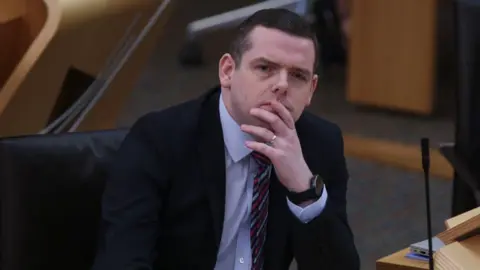 Getty Images
Getty ImagesIf Mr Johnson's premiership survives the lockdown party scandal, life could become very awkward for Mr Ross.
Although he brushed aside my suggestion in a recent interview that he might have to quit in these circumstances, he would surely come under pressure to do so.
Having in effect ruled out reconsidering his calls for the PM to quit and continuing to oppose the idea of leading a breakaway from the UK party, the alternative appears to be a protracted dispute.
It is hard to imagine how that could be sustainable. The Scottish Tories would have next to no influence with the UK government and would not be able to endorse their own candidate for PM at the next general election. Not credible.
Mr Ross is counting on enough of his colleagues following his example to force a leadership change so that he can seek reconciliation under new management.
But that is to get way ahead of where things are right now. It's make up your mind time for Tory MPs.
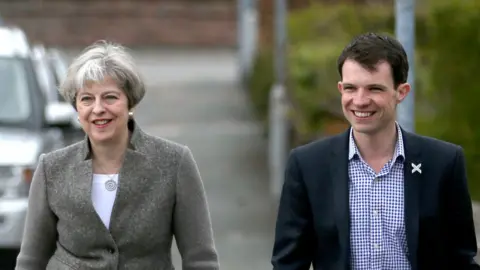 PA Media
PA MediaSo far the remaining four Scottish Conservatives have yet to go public with their verdicts, although Andrew Bowie, the MP for the marginal West Aberdeenshire and Kincardine seat, seems close to doing so.
He has already said that an apology from the PM is not enough and that Mr Johnson should be considering his position. But Mr Bowie, who recently quit as a vice-chairman of the UK party, has not yet called for Boris Johnson to go.
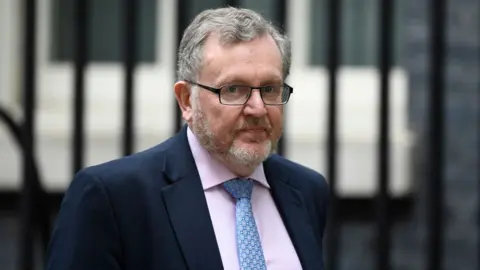 Getty Images
Getty ImagesFormer Scottish Secretary David Mundell and former Scotland office minister David Duguid - both dropped from government by Boris Johnson - have said they would wait for Sue Gray's report.
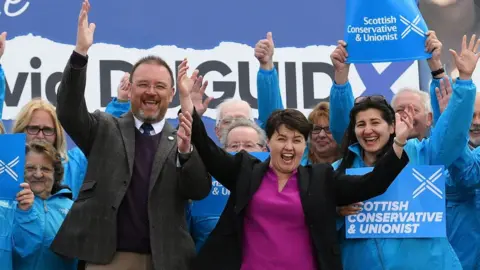 Getty Images
Getty ImagesThe MP for Berwickshire, Roxburgh and Selkirk - John Lamont - is presumably doing the same. He ran Jeremy Hunt's leadership campaign in Scotland in 2019 and is now a parliamentary aide to the foreign secretary, Liz Truss.
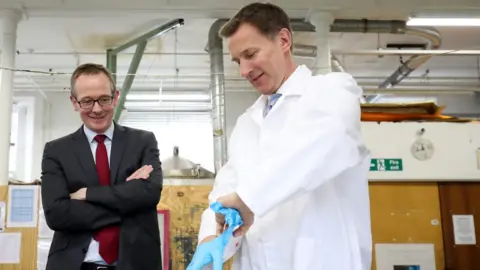 PA Media
PA MediaMs Truss and the Chancellor Rishi Sunak are among those tipped as potential leadership candidates if and when a vacancy arises.
There are only really three ways that could be brought about. Boris Johnson remains prime minister unless:
- he decides he's had enough and quits;
- he loses a general election and is obliged to stand down;
- or his MP colleagues move against him and force a confidence vote.
The third possibility seems the most likely at the moment but toppling their leader would be a huge step for Tory MPs to take.
Those who are undecided may want to consider exactly what Sue Gray says, how their constituents, local Tory associations and the wider public react and how Boris Johnson himself responds.
Mr Johnson is likely to attempt a fightback which may well include significant changes to Downing Street personnel. He has a track record of extricating himself from seemingly perilous political situations.
The difference this time is that several months of controversy appear to be hurting the Conservatives in the opinion polls, with Labour now consistently leading the Tories in UK voting intention trends.
That may well be a key consideration for Conservative MPs with a general election due in 2024, if not sooner.
For those who cannot or do not want to reach a firm conclusion, there is also another option. To defer again. Instead of waiting for Sue Gray, to say they are waiting for the Metropolitan police.
The police inquiry could take months. While that could buy the prime minister time, it would also mean the controversy over Boris Johnson's compliance with the covid rules he imposed, would continue to hang over the Conservatives.
